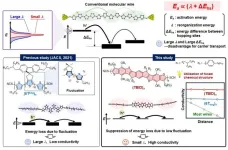(Press-News.org) Philadelphia, August 21, 2024 – Childhood obesity can contribute to the development of common immune-mediated skin diseases (IMSDs), such as alopecia areata, atopic dermatitis, and psoriasis, new research finds. Maintaining a healthy weight could potentially help lower the chances of developing these skin conditions. A novel study in the Journal of Investigative Dermatology, published by Elsevier, details the findings of an analysis of 2,161,900 Korean children from 2009 to 2020 to investigate the relationship between obesity or dynamic changes in body weight and the development of IMSDs.
IMSDs have detrimental effects on quality of life, including emotional, physical, social, and functional wellbeing, in children and their families. Although several biologics have proven effective for treating children with atopic dermatitis or psoriasis, limited treatment options and a lack of clinical trials for systemic therapy still present considerable challenges in treating children with IMSDs. Childhood obesity rates have surged over the past years, transforming it into an undeniable public health crisis, which was compounded by the effects of the pandemic and national lockdowns. The precise mechanisms responsible for the involvement of obesity in the development of chronic inflammatory skin diseases, including psoriasis, atopic dermatitis, and skin malignancies, remains uncertain.
Co-lead investigator of the study, Seong Rae Kim, MD, Department of Dermatology, Seoul National University College of Medicine, Seoul, Republic of Korea, explains, "Previously, many studies have looked at the link between childhood obesity and IMSDs. However, most of these studies only looked at data from one point in time or compared groups with and without the condition (i.e., obesity or overweight), and they had small sample sizes. Very few studies have followed children over a long period to see how their body weight affects the development of these skin conditions. This means we still don’t know for sure whether being obese or overweight causes atopic dermatitis and psoriasis or if the opposite is true. Also, no studies have yet looked at the effect of body weight on alopecia areata or how dynamic changes in a child’s weight affect development of common IMSDs."
Co-lead investigator Hyunsun Park, MD, PhD, Department of Dermatology, Seoul National University College of Medicine; Laboratory of Intestinal Mucosa and Skin Immunology; and Department of Dermatology, Seoul Metropolitan Government-Seoul National University Boramae Medical Center, Seoul, Republic of Korea, adds, "Our research team is very interested in the skin-gut access. We think that various factors, including diet, obesity, or other lifestyles can affect gut environment and contribute to the development of IMSDs. We are trying to find the puzzle pieces to demonstrate how they are connected, and our current research is a step towards that understanding. We conducted a large study using data from a national database in Korea, which includes information on almost all infants and children across the country. Our goal was to see how a child’s weight and changes in their weight are related to the development of alopecia areata, atopic dermatitis, and psoriasis."
The study revealed that children who were obese were more likely to develop common IMSDs compared to children with a normal weight. Among the three most common IMSDs, atopic dermatitis demonstrated the most obvious trend; children who gained weight (normal to overweight) had a higher risk of developing atopic dermatitis than children who maintained their normal weight, and children who lost weight (overweight to normal) had a lower risk of developing atopic dermatitis than children who maintained their overweight.
Co-lead investigator Seong-Joon Koh, MD, PhD, Department of Internal Medicine and Liver Research Institute, Seoul National University College of Medicine; and Laboratory of Intestinal Mucosa and Skin Immunology, Seoul, Republic of Korea, concludes, "Our findings support the importance of promoting weight maintenance among children who are already within the normal weight range because it may help reduce the risk of developing atopic dermatitis. In addition, prevention of excessive weight gain and purposeful weight loss, including adopting healthy diet strategies in children with obesity to prevent atopic dermatitis, particularly before school age, should be promoted. Implementing purposeful interventions, including nutritional strategies, to decrease body weight may aid in reducing the risk of developing IMSDs in children."
END
Obese children are more likely to develop skin conditions related to the immune system
Novel study published in the Journal of Investigative Dermatology reveals findings from a largescale study investigating changes in body weight in relation to common immune-mediated skin diseases, such as atopic dermatitis and psoriasis
2024-08-21
ELSE PRESS RELEASES FROM THIS DATE:
Quality control: neatly arranging crystal growth to make fine thin films
2024-08-21
Table salt and refined sugar look white to our eyes, but that is only because their individual colorless crystals scatter visible light. This feature of crystals is not always desirable when it comes to materials for optical and electrical devices, however.
Metal-organic frameworks are one such material. Crystalline with micropores, thin films of these nanomaterials have been attracting attention as a next-generation material that could also have an impact on environmental issues such as hydrogen storage and carbon dioxide capture. An Osaka Metropolitan University, Graduate School of Engineering team has found a way to control ...
How does organic farming benefit honeybees?
2024-08-21
Organic farming and flower strips promote the health of honey bees. In their vicinity, colonies grow stronger and are generally healthier. This is most likely because the insects have a diverse and continuous food supply there and are less exposed to pesticides. These are the findings of a new study by Martin Luther University Halle-Wittenberg (MLU) and the University of Göttingen, published in the Journal of Applied Ecology. The team analysed data from 32 bee colonies at 16 locations in Germany with different proportions of organic fields, flower strips and semi-natural habitats.
According ...
Survey: Most Americans comfortable with AI in healthcare
2024-08-21
COLUMBUS, Ohio – Artificial intelligence (AI) is all around us – from smart home devices to entertainment and social media algorithms. But is AI okay in healthcare? A new national survey commissioned by The Ohio State University Wexner Medical Center finds most Americans believe it is, with a few reservations.
The national poll of 1,006 people found:
75% believe using AI to minimize human errors is important.
71% would like AI to reduce wait times.
70% are comfortable with AI taking notes during an appointment.
66% believe ...
Students' toxin research shows public health benefits of citizen science
2024-08-21
Long-term exposure to arsenic, a hidden danger in many New England drinking water supplies, poses serious health risks, including cancer and cognitive challenges. A groundbreaking citizen science initiative called "All About Arsenic" has emerged in response, empowering students and communities to tackle such health threats head-on.
The benefits are detailed in a peer-reviewed article published today in the journal Environmental Health Perspectives. An accompanying commentary by researchers at Columbia University’s Mailman School of Public ...
Molecular wires with a twist
2024-08-21
Osaka, Japan – From the high-voltage wires that carry electricity over long distances, to the tungsten filaments in our incandescent lights, we may have become accustomed to thinking that electrical conductors are always made of metal. But for decades, scientists have been working on advanced materials based on carbon-based oligomer chains that can also conduct electricity. These include the organic light-emitting devices found in some modern smartphones and computers.
In quantum mechanics, electrons are not just point particles with definite ...
The power of play: Strengthening senior wellbeing through generational bonds
2024-08-21
Watching your children frolic through a playground is one of the many joys of being a parent or grandparent, but new research has found that engaging in play with kids could help improve mental health.
Researchers from the University of South Australia (UniSA) and the University of Canberra (UC) have explored the benefits of intergenerational play through specially designed playgrounds for kids and adults.
Intergenerational play brings young children and older people together to engage in enjoyable and creative activities such as storytelling, using playground equipment, and games.
The world is facing an ...
The underrated impact of humidity
2024-08-21
Governments, medical institutions and other bodies require accurate models on health-related matters in order to better organize their activities. Climate change has measurable impacts on society, including on human mortality. However, current models to assess the health impacts of climate change do not account for every environmental parameter, especially humidity, which could influence heat stress perceived by the human body, leaving room for improvement. For the first time, researchers, including those from the University of Tokyo, successfully incorporated humidity data from hundreds of cities into so-called heat stress indicators ...
Sharing risk to avoid power outages in an era of extreme weather
2024-08-21
In brief
Extreme weather is leading to more frequent power grid strain and electricity outages.
There are a range of regional cooperation agreements among utilities to share electricity.
Expanding cooperation areas in the West could cut outage risks by as much as 40%.
Expanding cooperation among electricity providers could also help ensure public opinion and policy remain favorable for renewable energy growth.
This summer’s Western heat waves raise the specter of recent years’ rotating power outages and record-breaking electricity demand in the region. ...
Gut bioelectricity provides a path for bad bacteria to cause diseases
2024-08-21
How do bad bacteria find entry points in the body to cause infection?
This question is fundamental for infectious disease experts and people who study bacteria. Harmful pathogens, like Salmonella, find their way through a complex gut system where they are vastly outnumbered by good microbes and immune cells. Still, the pathogens navigate to find vulnerable entry points in the gut that would allow them to invade and infect the body.
A team of UC Davis Health researchers has discovered a novel bioelectrical mechanism these pathogens use to find these openings. Their study was ...
RPI and Hokkaido University sign letter of intent for semiconductor collaboration
2024-08-21
Today, Rensselaer Polytechnic Institute and Hokkaido University of Japan announced their plan to explore collaborative opportunities in semiconductor education and research contributing to semiconductor workforce development initiatives.
The two universities recognized the new partnership with a letter of intent signing ceremony held in the Curtis R. Priem Experimental Media and Performing Arts Center, with representatives from the Hokkaido Prefecture government, the Japanese semiconductor company Rapidus, IBM, NY CREATES, and RPI faculty and students in attendance.
Before the signing ceremony, the Japanese delegation toured the IBM Quantum System One ...
LAST 30 PRESS RELEASES:
Brexpiprazole as an adjunct therapy for cognitive dysfunction in schizophrenia
Applications of endovascular brain–computer interface in patients with Alzheimer's disease
Path Planning Transformers supervised by IRRT*-RRMS for multi-mobile robots
Nurses can deliver hospital care just as well as doctors
From surface to depth: 3D imaging traces vascular amyloid spread in the human brain
Breathing tube insertion before hospital admission for major trauma saves lives
Unseen planet or brown dwarf may have hidden 'rare' fading star
Study: Discontinuing antidepressants in pregnancy nearly doubles risk of mental health emergencies
Bipartisan members of congress relaunch Congressional Peripheral Artery Disease (PAD) Caucus with event that brings together lawmakers, medical experts, and patient advocates to address critical gap i
Antibody-drug conjugate achieves high response rates as frontline treatment in aggressive, rare blood cancer
Retina-inspired cascaded van der Waals heterostructures for photoelectric-ion neuromorphic computing
Seashells and coconut char: A coastal recipe for super-compost
Feeding biochar to cattle may help lock carbon in soil and cut agricultural emissions
Researchers identify best strategies to cut air pollution and improve fertilizer quality during composting
International research team solves mystery behind rare clotting after adenoviral vaccines or natural adenovirus infection
The most common causes of maternal death may surprise you
A new roadmap spotlights aging as key to advancing research in Parkinson’s disease
Research alert: Airborne toxins trigger a unique form of chronic sinus disease in veterans
University of Houston professor elected to National Academy of Engineering
UVM develops new framework to transform national flood prediction
Study pairs key air pollutants with home addresses to track progression of lost mobility through disability
Keeping your mind active throughout life associated with lower Alzheimer’s risk
TBI of any severity associated with greater chance of work disability
Seabird poop could have been used to fertilize Peru's Chincha Valley by at least 1250 CE, potentially facilitating the expansion of its pre-Inca society
Resilience profiles during adversity predict psychological outcomes
AI and brain control: A new system identifies animal behavior and instantly shuts down the neurons responsible
Suicide hotline calls increase with rising nighttime temperatures
What honey bee brain chemistry tells us about human learning
Common anti-seizure drug prevents Alzheimer’s plaques from forming
Twilight fish study reveals unique hybrid eye cells
[Press-News.org] Obese children are more likely to develop skin conditions related to the immune systemNovel study published in the Journal of Investigative Dermatology reveals findings from a largescale study investigating changes in body weight in relation to common immune-mediated skin diseases, such as atopic dermatitis and psoriasis





